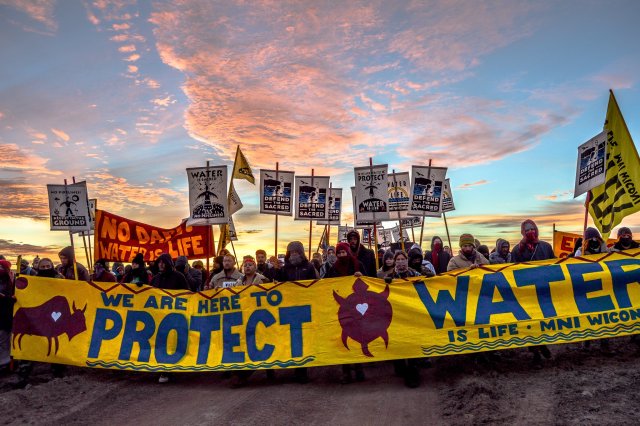
The Standing Rock Sioux Tribe recently won a major legal victory in federal court which may have the power to force the shutdown of the $3.8 billion Dakota Access pipeline.
District Judge James Boasberg ruled on June 28 that the Donald Trump administration failed to conduct an adequate environmental review of the pipeline, after President Trump ordered the Army Corps of Engineers to fast-track and green light its approval.
The judge requested additional briefings on whether the pipeline should be shut off until the completion of a full review of a potential oil spill’s impacts on fishing and hunting rights, as well as environmental justice.
The pipeline faced months of massive resistance from the Standing Rock Sioux Tribe, members of hundreds of other indigenous tribes from across the Americas, as well as non-Native allies.
Speaking to Democracy Now!’s Amy Goodman, Standing Rock Sioux Chair Dave Archambault II explained the tribe’s lawsuit: “From the very beginning, we asked the Corps of Engineers, ‘What impact will this pipeline have on our people?’ And the Corps of Engineers never could answer that.
“Their response is, ‘We’re doing an environmental assessment, and we’re going to see what impact it will have on the environment.’ And there’s no impact. That’s their — that’s what they state.
“‘Well, we need to do a further look and see what really happens when infrastructure projects have an impact on our people’ ... that’s the question we asked. And to get the answer, it required a full, in-depth environmental impact statement.”
During the interview Goodman also referred to explosive revelations regarding the private security firm TigerSwan, which was hired to collaborate closely with law enforcement agencies to spy on the nonviolent indigenous-led movement.
According to leaked internal documents, TigerSwan targeted Dakota Access water protectors with military-style counterterrorism measures and accused those opposing the pipeline of being "insurgents" and the movement "an ideologically driven insurgency," even using words like "jihadi."
Responding to these accusations, Nick Tilsen, executive director of the Thunder Valley Community Development Corporation and a citizen of the Oglala Lakota Nation on Pine Ridge Reservation in South Dakota, told Goodman: “How is it possible that any indigenous people are insurgents on their own land?
“Our land has been overrun by corporations, by the militarisation of our lands and our communities and our people. It’s impossible for us, as indigenous people on our only land, to be insurgents.
“If there’s insurgents, it’s the company. If there’s insurgents, it’s the private military company. We were not insurgents. We were people fighting for what was right, simply fighting for what we believed in and protecting water on behalf of 17 million Americans...”
Archambault also spoke to Goodman about some of the initiatives being undertaken at Standing Rock in terms of promoting renewable energy.
“We have over 12 communities on Standing Rock” said Archambault. “What would be a dream or goal is to have all 12 communities powered off renewable ... if tribes, Native tribal nations can say we are 100% powered and 100% that we consume renewable energy, that builds awareness for other communities and then maybe the nation...
“With the solar panels, we’re starting off with a 300-kilowatt project. On the commercial wind side, we have a resource, and that’s the wind, that can generate a lot of electricity in the Great Plains ... it will be a commercial wind farm, so that we’re talking like 100 megawatts, producing on average maybe 40 to 50 megawatts annually.
“So we’ll be able to take those — that power and sell it commercially and then use the resources to offset or to evolve our homes, so that they can provide heat in a good way, rather than burning fossil fuels.”
Tilsen added: “We’re fighting for our very future. And, you know, we have to be able to meet the needs of our present generation without compromising the ability of future generations to meet their own needs.
“And this is a very indigenous way of thinking, indigenous values way of thinking. It’s also a very practical way of thinking, because the past energy and economic model that this country has been operating on has continued to create a separation between the rich and the poor, exploit lands, and we’re fighting for something very different.
“Let’s make sure something happens for the people of Standing Rock. Let’s make sure that this inspiration happening at Standing Rock benefits the people of Standing Rock... This can have a ripple effect to what happens all throughout Indian country, and hopefully begin to reform the way that energy policy and energy projects happen.”
[Abridged from Democracy Now!]
Like the article? Subscribe to Green Left now! You can also like us on Facebook and follow us on Twitter.